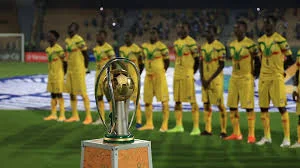Football is more than just a sport in Africa; it’s a powerful force that unites millions across the continent. Two major tournaments stand out in the African football landscape: the African Nations Championship (CHAN) and the Africa Cup of Nations (AFCON). While both tournaments are crucial for African football, they cater to different aspects of the sport and feature unique characteristics.
- CHAN focuses on locally-based players from African domestic leagues, showcasing regional talent in a competitive environment.
- AFCON, on the other hand, is a premier tournament for national teams, drawing players from international clubs to represent their countries on a continental stage.
Understanding the differences between CHAN and AFCON can provide valuable insights into their respective roles and impacts on African football. In this article, we will delve into the history, format, and significance of each tournament, highlighting how they contribute to the sport and affect fans and players alike. From eligibility criteria to tournament structure, we will explore every facet to give you a comprehensive overview of these essential football competitions.
1. Overview of CHAN (African Nations Championship)
1.1 History and Origins
The African Nations Championship (CHAN) was established to spotlight domestic talent within African leagues, differentiating itself from other continental competitions. Launched in 2009 by the Confederation of African Football (CAF), CHAN aimed to provide a platform exclusively for players who compete in their home country’s leagues, avoiding the reliance on international club players.
Key milestones in CHAN’s history include:
- The inaugural tournament in 2009, held in Ivory Coast, which set the stage for future editions.
- The expansion of the tournament’s format to include more teams, enhancing its competitiveness and reach.
CHAN was designed to develop local talent and enhance the profile of domestic leagues by providing a competitive stage for players who might not yet have international experience. This focus on home-based players helps in improving the overall quality of African football and in creating a stronger connection between fans and their local teams.
1.2 Tournament Structure and Format
The CHAN tournament format is distinct in its approach. It features 16 teams, which compete in a series of matches to qualify for the knockout stages. The tournament is typically held every two years, allowing teams ample time to prepare and refine their strategies.
Key aspects of the CHAN format include:
- Group Stage: Teams are divided into groups, where they play round-robin matches to secure a place in the knockout rounds.
- Knockout Stage: The top teams from each group advance to the knockout stage, which includes quarter-finals, semi-finals, and the final.
The tournament lasts about a month, with matches spread across various cities in the host nation, enhancing the local football culture.
1.3 Eligibility and Participation
Eligibility criteria for CHAN are unique compared to other tournaments. Only players who are active in their country’s domestic leagues are eligible to participate. This rule ensures that the tournament remains focused on developing local talent and highlights the quality of domestic leagues.
For example:
- A player currently representing a club in the South African Premier Division can participate in CHAN, provided they meet other eligibility requirements.
- Players who have competed in international leagues are not eligible, which sets CHAN apart from other continental tournaments like AFCON.
This criterion helps in showcasing homegrown talent and provides an opportunity for local players to gain recognition and experience.
1.4 Significance and Impact
CHAN’s significance lies in its role in promoting local football and providing a platform for domestic players to shine on a continental stage. The tournament has had a substantial impact on the development of African football by:
- Enhancing the visibility of domestic leagues.
- Providing a competitive environment for local players to showcase their skills.
Notable achievements in CHAN include several underdog teams reaching the finals and even winning the tournament, which demonstrates the competitive nature of African football. The success stories and growth resulting from CHAN help in strengthening the overall football infrastructure in Africa, making it a vital part of the continent’s football ecosystem.
2. Overview of AFCON (Africa Cup of Nations)
2.1 History and Origins
The Africa Cup of Nations (AFCON) is Africa’s premier football competition, established in 1957 by the Confederation of African Football (CAF). Unlike CHAN, AFCON features national teams from across the continent and is renowned for its high level of competition and historic significance.
Key historical milestones include:
- The first tournament held in Sudan, where Egypt emerged as the inaugural champion.
- The evolution of AFCON into a major international event, attracting players from top European clubs.
AFCON was created to celebrate and promote football across Africa, offering a prestigious platform for national teams to compete. Its rich history reflects the growth and development of football in Africa, making it a key fixture on the international football calendar.
2.2 Tournament Structure and Format
The AFCON tournament format differs significantly from CHAN, reflecting its broader scope. The tournament usually involves 24 teams, with a structured qualification process leading up to the final competition.
Key aspects of the AFCON format include:
- Qualifying Rounds: Teams compete in a series of matches leading up to the final tournament, ensuring a diverse representation from across Africa.
- Group Stage: The 24 teams are divided into groups, where they play round-robin matches to secure a place in the knockout stages.
- Knockout Stage: The top teams from each group advance to the knockout stage, culminating in quarter-finals, semi-finals, and the final.
AFCON typically lasts about a month and is held every two years. The tournament rotates among different host countries, showcasing various African cultures and footballing traditions.
2.3 Eligibility and Participation
Eligibility criteria for AFCON include players who are active in both domestic and international leagues. This allows for a broader selection of talent, including those who play for European clubs and other international teams.
For example:
- Players like Mohamed Salah, who represents Egypt and plays in Europe, are eligible for AFCON.
- Teams are comprised of the best available players from around the world, representing their national teams.
This inclusive approach ensures that AFCON features some of the best footballing talent globally, making it a highly competitive and prestigious tournament.
2.4 Significance and Impact
AFCON’s significance extends beyond just being a football tournament. It plays a crucial role in the development of African football and in fostering national pride. The tournament’s impact includes:
- Boosting National Pride: AFCON provides a platform for countries to showcase their footballing prowess and foster national pride.
- Promoting Football Development: It helps in the development of football infrastructure and talent across the continent.
AFCON has produced memorable matches and legendary players who have left a lasting impact on football history. Its success in attracting global attention and showcasing African football talent makes it a cornerstone of the continent’s football landscape.
3. Key Differences Between CHAN and AFCON
3.1 Purpose and Focus
The purpose of CHAN and AFCON highlights their different focuses within African football.
- CHAN is designed to showcase domestic talent by featuring only players who compete in their home country’s leagues. This tournament emphasizes the development of local football and aims to improve the visibility and quality of domestic leagues.
- AFCON, in contrast, focuses on national teams and includes players from both domestic and international clubs. It provides a platform for nations to compete at the highest level, showcasing a broader range of talent and fostering international competition.
The focus of each tournament reflects its role in the football ecosystem, with CHAN serving as a platform for local players and AFCON representing the pinnacle of continental football competition.
3.2 Eligibility Criteria
Eligibility criteria are a significant differentiator between CHAN and AFCON.
- CHAN’s eligibility is restricted to players who are currently active in their home country’s domestic league. This means that players representing international clubs cannot participate, ensuring that the tournament remains focused on homegrown talent.
- AFCON’s eligibility, however, includes players from both domestic and international leagues. This broader criterion allows for the inclusion of top talent from around the world, providing a more diverse and competitive field.
These differing eligibility criteria influence the quality and style of play in each tournament, with CHAN highlighting domestic talent and AFCON featuring a global array of football stars.
3.3 Tournament Format and Structure
The tournament structure of CHAN and AFCON showcases their distinct approaches to competition.
- CHAN typically involves 16 teams competing in a format that includes group stages followed by knockout rounds. The relatively smaller number of teams allows for a more focused competition on regional talent and provides opportunities for emerging teams to compete.
- AFCON features a larger pool of 24 teams, with a more extensive qualifying process leading up to the final tournament. The format includes group stages and knockout rounds, similar to CHAN, but on a larger scale, reflecting its role as a premier continental competition.
The difference in format between CHAN and AFCON underscores their respective scopes, with CHAN focusing on domestic leagues and AFCON on broader continental competition.
3.4 Historical Significance and Impact
The historical significance and impact of CHAN and AFCON on African football are profound but distinct.
- CHAN has played a crucial role in developing local football talent and enhancing the profile of domestic leagues. Its impact includes improving the quality of domestic competitions and providing a competitive stage for emerging players.
- AFCON, with its long history and high-profile matches, has significantly influenced African football by fostering national pride and boosting the profile of the sport on the global stage. Its impact includes enhancing football infrastructure and providing a prestigious platform for top players.
Both tournaments contribute uniquely to the growth and development of African football, with CHAN focusing on local talent and AFCON providing a platform for continental and international competition.
4. Notable Teams and Players in CHAN and AFCON
4.1 CHAN Highlights
CHAN has showcased many notable teams and players who have made significant impacts on the tournament. The competition often features emerging talents who later become stars in international football.
- Notable Teams:
- Morocco is a dominant team in CHAN, winning the tournament multiple times, including in 2018 and 2020. Their consistent performance highlights their strong domestic league and effective development of local talent.
- Congo has also made a mark, securing the title in 2016 and demonstrating the strength of Central African football.
- Notable Players:
- Hakim Ziyech (Morocco) made his mark in CHAN before achieving international fame. His performances in the tournament helped him gain recognition and transition to a successful career in European football.
- Trezeguet (Egypt) was another standout player, showcasing his skills in CHAN and later representing his country on a larger stage.
These teams and players highlight the role of CHAN in developing and promoting domestic football talent, providing a springboard for future successes.
4.2 AFCON Highlights
AFCON has been a stage for many legendary teams and players, making it one of the most prestigious tournaments in African football.
- Notable Teams:
- Egypt is the most successful team in AFCON history, with a record seven titles. Their dominance in the tournament reflects the strength of Egyptian football and its rich footballing tradition.
- Cameroon and Nigeria are also prominent, with multiple titles each. Their successes showcase the competitive nature of West and Central African football.
- Notable Players:
- Samuel Eto’o (Cameroon) is a legendary figure in AFCON history, known for his prolific goal-scoring and leadership. His contributions helped Cameroon secure titles and left a lasting legacy in African football.
- Didier Drogba (Ivory Coast) is another iconic player who made significant contributions to AFCON. His performances and leadership were instrumental in Ivory Coast’s successes in the tournament.
These teams and players demonstrate the high level of competition and talent that AFCON attracts, making it a central event in African football.
5. Impact on African Football Development
5.1 CHAN’s Contribution to Local Football
CHAN plays a crucial role in the development of local football across Africa by focusing on home-based players. This emphasis on domestic leagues has several significant impacts:
- Talent Development: By providing a platform for players who compete in their home country’s leagues, CHAN helps in nurturing local talent. Players gain valuable experience and exposure, which can lead to further opportunities in international football.
- League Improvement: The visibility provided by CHAN can enhance the profile of domestic leagues, encouraging investments and improvements in infrastructure. This, in turn, helps in raising the overall standard of local football.
For instance, clubs in countries like Morocco and Algeria have benefited from increased attention due to their teams’ performances in CHAN. This increased focus helps in the development of better facilities and coaching standards.
5.2 AFCON’s Role in Advancing Football
AFCON has a broader impact on the development of African football by fostering national pride and attracting global attention to the continent’s footballing prowess.
- National Pride: The tournament serves as a major event that unites nations and enhances national pride. Winning or performing well in AFCON can boost a country’s footballing culture and inspire young players.
- International Exposure: AFCON attracts global audiences, including scouts and sponsors. This international exposure helps in showcasing African talent on a larger stage, often leading to players securing contracts with top clubs around the world.
For example, the success of players like Sadio Mané, who shone in AFCON before moving to major European leagues, underscores the tournament’s role in promoting African talent globally.
5.3 Comparative Impact
While both CHAN and AFCON contribute to the development of football in Africa, their impacts differ:
- CHAN is instrumental in enhancing domestic leagues and fostering local talent. Its focus on home-based players provides a vital platform for the growth of local football infrastructure.
- AFCON serves as a premier continental event that showcases the best talent and fosters national pride. Its broader scope and international appeal contribute to the global recognition of African football.
The combination of CHAN’s focus on local development and AFCON’s role in continental and international competition creates a comprehensive framework for advancing football in Africa. Both tournaments play essential roles in the ecosystem, each contributing uniquely to the sport’s growth and development.
6. Challenges and Criticisms
6.1 Challenges Facing CHAN
CHAN faces several challenges that impact its effectiveness and reputation:
- Limited Visibility: Compared to AFCON, CHAN often struggles with lower visibility and media coverage. This limited exposure can affect the tournament’s appeal to sponsors and fans, reducing its overall impact.
- Funding and Resources: Organizing CHAN requires significant financial resources. Some host countries may face challenges in providing adequate facilities and infrastructure, affecting the quality of the tournament.
- Player Development: While CHAN is designed to showcase domestic talent, it sometimes faces criticism for not fully integrating players into the broader football ecosystem. The focus on home-based players can limit exposure to international competition, which is crucial for player development.
Despite these challenges, CHAN remains a vital platform for promoting local football and improving domestic leagues across Africa.
6.2 Challenges Facing AFCON
AFCON also faces its own set of challenges:
- Logistical Issues: Hosting AFCON can be logistically challenging, with issues related to stadium availability, transportation, and accommodations. These logistical hurdles can impact the smooth execution of the tournament.
- Political and Economic Factors: Political instability or economic difficulties in host countries can affect the organization of AFCON. Such factors may lead to delays or changes in plans, impacting the tournament’s overall experience.
- Player Availability: The timing of AFCON, which often coincides with club seasons in Europe, can lead to issues with player availability. Clubs may be reluctant to release their star players for the tournament, affecting the level of competition.
Addressing these challenges is crucial for maintaining the prestige and effectiveness of AFCON as a premier football competition in Africa.
6.3 Comparative Criticisms
Both CHAN and AFCON have faced criticisms that reflect their differing scopes:
- CHAN Criticisms: Focused on home-based players, CHAN may sometimes lack the competitive edge seen in international tournaments. The limited visibility and resources can hinder its growth and impact.
- AFCON Criticisms: Despite its prominence, AFCON faces challenges related to logistics and political factors. The timing of the tournament can also affect player participation and competition levels.
Understanding these challenges and criticisms is important for improving both CHAN and AFCON. Addressing these issues can enhance the tournaments’ effectiveness and their contributions to the development of African football.
7. Future Prospects and Developments
7.1 Future Prospects for CHAN
CHAN has several opportunities for growth and improvement in the coming years:
- Increased Visibility: Enhancing media coverage and promotion can boost CHAN’s profile. Collaborations with broadcasters and digital platforms can help in reaching a wider audience and attracting more fans.
- Improved Infrastructure: Investments in better facilities and resources can elevate the tournament’s quality. Ensuring that host countries are equipped with modern stadiums and training facilities will enhance the overall experience for players and fans.
- Expanded Format: Considering an expansion in the number of participating teams could increase the tournament’s competitiveness and appeal. This change could also allow for more diverse representation from across the continent.
For instance, leveraging technological advancements and engaging with global sponsors can contribute to CHAN’s growth, providing a more robust platform for local talent and domestic leagues.
7.2 Future Prospects for AFCON
AFCON also has exciting prospects for the future:
- Global Expansion: Increasing international partnerships and expanding the tournament’s global reach can enhance its prestige. This expansion could involve more collaborations with global football organizations and media outlets.
- Enhanced Fan Experience: Investing in fan engagement and experiences can boost AFCON’s appeal. Innovative initiatives, such as interactive fan zones and improved digital experiences, can attract a larger audience.
- Sustainability Initiatives: Implementing sustainable practices in organizing the tournament can improve its environmental impact. Focusing on green initiatives, such as eco-friendly stadiums and transportation, can enhance AFCON’s reputation.
For example, AFCON’s future can benefit from embracing new technologies and engaging with a global audience, making the tournament a major event on the international football calendar.
7.3 Comparative Future Developments
CHAN and AFCON both face unique opportunities and challenges for future development:
- CHAN’s Development: Emphasizing increased visibility and better infrastructure can significantly impact the tournament’s growth. Expanding the format and integrating more advanced technologies can enhance its competitive edge.
- AFCON’s Development: Expanding its global presence and improving fan experiences can further solidify AFCON’s status as a premier continental event. Focusing on sustainability and international partnerships can also contribute to its long-term success.
By addressing their respective challenges and leveraging opportunities, both CHAN and AFCON can continue to grow and make meaningful contributions to African football. Their future developments will play a crucial role in shaping the landscape of football on the continent and beyond.
8. Conclusion
The African Nations Championship (CHAN) and the Africa Cup of Nations (AFCON) are two distinct yet significant football tournaments with unique roles in the development of African football. While CHAN focuses on home-based players, offering them a platform to shine and improve domestic leagues, AFCON serves as the pinnacle of continental competition, showcasing the best talent from across the continent and attracting global attention.
Summary of Key Points:
- CHAN:
- Highlights domestic talent and strengthens local leagues.
- Provides exposure and opportunities for players from home-based teams.
- Faces challenges such as limited visibility and resource constraints, but has prospects for growth through increased media coverage and infrastructure improvements.
- AFCON:
- Features a broader scope, including players from both domestic and international clubs.
- Acts as a major event for national pride and global recognition of African football.
- Encounters logistical and political challenges but has potential for enhancement through global expansion and improved fan experiences.
Both tournaments play crucial roles in advancing football in Africa. CHAN focuses on nurturing local talent and improving domestic football infrastructure, while AFCON highlights the continent’s footballing prowess on an international stage.
Looking ahead, the continued development and success of CHAN and AFCON will depend on addressing their respective challenges and leveraging opportunities for growth. By enhancing their visibility, infrastructure, and global reach, both tournaments can contribute to the ongoing evolution of African football and strengthen its position in the global sports arena.

Justin Taylor, a sports aficionado, brings unmatched energy and expertise to SpoortsUp.com. Known for his sharp commentary and insightful predictions, Justin’s writing resonates with fans across the globe. His unique perspective on the sports world keeps readers both informed and entertained.











